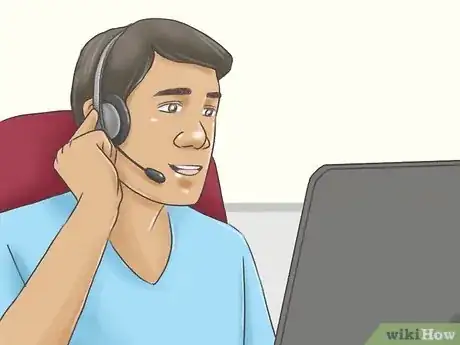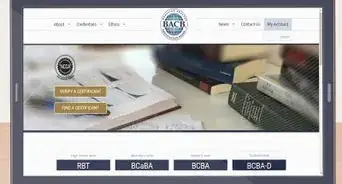wikiHow is a “wiki,” similar to Wikipedia, which means that many of our articles are co-written by multiple authors. To create this article, 14 people, some anonymous, worked to edit and improve it over time.
This article has been viewed 127,365 times.
Learn more...
Most people think of the insanely quick-yet-clear speech of the auctioneer as their main skill, but there's much more to it than that. In fact, an auctioneer's involvement behind the scenes is just as important to the success of an auction as their talent in generating bidders!
Steps
Breaking into the Biz
-
1Obtain your high school diploma or General Equivalency Diploma (G.E.D). In order to qualify for a license (or to be taken seriously), you'll need to have your diploma or G.E.D. Take speech, marketing, history, business and agriculture classes while in school. These courses will help prepare you for the various roles required as an auctioneer.
- Though college isn't necessary, it can be useful. A recent poll taken by the NAA (National Auctioneers Association), 35% have degrees while another 36% have some sort of college experience.[1]
-
2Attend auctions. This is the natural first step to becoming an auctioneer. Start attending auctions! Watch the roles the auctioneer fills during a typical auction day. Observe his actions, decisions and skill. There's a lot more to it than just chanting quickly!Advertisement
-
3Work part-time for an auction company. If you're in high school or just looking to get some experience, start working for an auction company doing whatever odd jobs you can. Even if you're just organizing pieces to sell or sweeping the floor, it gets your foot in the door.
- Serve as a ring-side helper that hands items to an auctioneer and aids in crowd control.
- Work as a bid watcher. The auctioneer needs help to identify everyone making bids, especially during busy and well-attended auctions. A bid watcher identifies bidders whom the auctioneer doesn't see.
- Help set up auctions prior to bidding. Auctioneers rely on help to unpack, set out and arrange auction items for viewing and bidding. Learn more about the business by working on a set-up crew.
-
4Research state and local laws regarding licensing requirements. Now that you've got your feet wet, do you like what you see? You may choose whether you want to go on to get your license and become an auctioneer. Currently, 37 states in the US require licensure.[1] Proceed with licensing guidelines as your state requires.
- Some states require you go to an NAA affiliated school, some states want one or two years of experience before you're allowed to take the final exam, some want a formal apprenticeship, and some states will allow some combination of the aforementioned types of experience.[2] If you can get hands-on experience, you may not have to take a course.
-
5Start working charity gigs. That's right -- you don't need a license to be an auctioneer for charity gigs.[3] It's basically volunteer work (you're not making any money), so it's open to whoever is kind enough to donate their time. It's a great way to start developing a résumé and to get your name out there. In time, it'll be all about your reputation. It's for a good cause too; did we mention that?
Getting Licensed
-
1Attend auctioneer school. Though this isn't always necessary, it's definitely valuable experience. Unless you've grown up with a gavel in your hand instead of a pacifier (aka gotten into the family business), this may be the route for you.The NAA has a list of schools on their website.
- Currently the NAA has schools in the US, Canada, South Africa, and an affiliate in Australia.[2]
Depending on your location, you may be able to get away with a course that's only a few weeks long or you may need to take one that's closer to a standard college semester. Either way, it's not that long.
- Choose between an on-site school or a virtual program. Auctioneer schools are located across the globe, and many programs are offered online. You'll be taking classes in bid calling, marketing and basic business management.
- Currently the NAA has schools in the US, Canada, South Africa, and an affiliate in Australia.[2]
Depending on your location, you may be able to get away with a course that's only a few weeks long or you may need to take one that's closer to a standard college semester. Either way, it's not that long.
-
2Get an apprenticeship. Some states, like Ohio and Tennessee, require 1 or 2 years (respectively) of experience before you're even allowed to sit for the exam. But regardless of the rules in your jurisdiction, it's a good idea to start getting experience as soon as possible.
- There is such a thing as an apprentice auctioneer license. This is generally a stepping stone (often required) in states that do require the experience before the exam. Exam fees currently sit at around a couple hundred dollars in most areas.[3]
-
3Take the exam. In most areas, it's offered quarterly.[3] Your state should have information on how to study for the test, like Texas' Green Book. But since you're already in the auctioneer network, you'll have plenty of other resources to hit up, too.
- Certain states have reciprocity laws. That means that your license is good in the states that recognize your state's license, but not good in others. If you want a license in a state that doesn't work like this, you'll need to fulfill their requirements and take their exam.[3]
-
4Apply for your license. Once you've taken the exam and passed (if you fail, generally you can take it twice in the next year period), you can apply for your license! This generally just proves that you've done the work and you're a legitimate auctioneer. Congratulations! And, yes, this will cost another couple hundred bucks.
-
5Join a professional organization. Nearly every U.S. state has a professional organization for auctioneers. National organizations exist, too, and offer continuing education and other resources to members. The NAA is a great place to start. There are competitions and conferences you can attend, too.
- Many organizations, including at state level, provide testing opportunities for auctioneers to prove their expertise. Becoming certified or accredited improves your credibility and professionalism as an auctioneer.
-
6Maintain another career. It's difficult to become an overnight success as an auctioneer. Keep a regular job or stay with your current career until you have managed enough success to replace a regular salary. Most auctioneers start off part-time.[4]
Getting the Gigs
-
1Work for an auction company or auction house. Most auction companies are independent ventures -- people like you have started out as auctioneers and then opened up their own business. However, there are some "houses" that are chains and are quite huge. Just like any employer, some are better than others, but you'll never know until you try.
- Try to find an auction company that specializes in your area (agriculture, antiques, etc.) and is willing to work with you and your schedule. Do they provide mentorship? What do they charge overhead? Will you be an employee or a contractor? These are things to consider when looking for employment.
-
2Become an expert in various topics. Auctioneers are often sought due to their expertise in certain areas. You'll need to be able to look at an item and roughly tell what condition it's in and what factors matter about it. If you overlook a scratch, you could be starting way too high. Here are the most common subtopics of auctioneering:
- Learn about livestock and agriculture. Many auctions sell livestock and agricultural equipment.
- Acquire knowledge about antiques. Auctions regularly include antique items, and it helps to know information about eras of history and historical items.
- Auction off vehicles as an expert. Learn about makes, models, years, engines and unique trivia about vehicles.
- Some states, like Tennessee again, have a specific license for public automobile auctioneers.
-
3Market your auctions. You will be held highly responsible for the turnout at your auctions. In order to get bidders in the first place, you'll need to market your auctions with the right media at the right places and times and to the right people. If the auction happens and the products don't walk, your client will not be happy.
- It's important to know your audience here. If you have an estate auction that is mostly Elvis memorabilia and thousands of vinyl records, that's totally different than an estate sale that's all 19th century modern art and fine china. The expanse of your network will be very, very important here.
-
4Go on the road. If you live in an area with a small population, you're obviously going to get more bites elsewhere. Consider networking throughout your entire region or even moving to an area that caters to your specialty (heavy into agriculture or just plain affluent, for starters). The more people you can reach, the more opportunities you'll have to build yourself.
Rising to the Top
-
1Practice bid calling. Use a mirror, record yourself, make bid calls aloud and use your skills in public. If you went to school for auctioneering, they'll get you started on this. Bid calling is an art, as are describing auction items and dealing with customers. Improve your skills by practicing them regularly.
- Bid calling is obviously the most visible part of the auctioneer's job, but it's only a very small portion of it. While it does matter, you also have to be charismatic, a great marketer, and have good administration skills to boot.
-
2Become an entertainer. A good auctioneer is more than just someone who knows their product and can speak ridiculously fast and still maintain clarity. They're entertaining the entire room! An auctioneer that charms their audience can drive prices up 20%.[4] Don't get the crowd buzzing and the auction is a bust.
- If it wasn't clear, you'll be working on commission most of the time. So the more money you get your crowd to pay, the better off you'll be. So you gotta work it!
- To a certain extent, you'll be coaxing your audience to pay more. People will automatically start to get hesitant as the prices rise -- it's your job to be persuasive and convince them (without them really knowing it) that they're making a good decision by upping the ante.
-
3Get the etiquette down. A good auctioneer is often quite classy. You may be working with items that cost a pretty penny and your demeanor should match. Bidders are not "the woman with the orange hat over there" and you don't point at people for bids. You are working with ladies and gentlemen and your hand should always be an open palm.[4]
- If you're on TV, there will be different protocol for that too -- you'll need to occasionally address your listeners that are just tuning in. Ramp up your charm, be ever-so-tactful, and wear a bright colored tie or top.[4]
-
4Know it's more work than what it looks like. In addition to all the prep work you'll have to do (working with clients, working with dealers, etc.) and manning the stand at the auction itself, you'll be sorting out every little detail that occurs that day. And there will be loads!
- For starters, you'll be working for absentee bidders, handling reserve prices (sometimes the owner doesn't want to go too low -- and even then they might get upset), and working the crowd in between showcases. People will come to you with all their questions, so you have to be prepared with all the answers!
Community Q&A
-
QuestionWhat is the average pay of an auctioneer?
 Community AnswerMost auctioneers work on a commission if they own the business. If they are just contract bid callers, their day rate depends on the level of skill, ranging from $100 a day to thousands of dollars per day.
Community AnswerMost auctioneers work on a commission if they own the business. If they are just contract bid callers, their day rate depends on the level of skill, ranging from $100 a day to thousands of dollars per day. -
QuestionWhere are the training schools for an auctioneer student in Phoenix?
 Community AnswerThe nearest school to Arizona is Worldwide College of Auctioneering, which has an autumn class in Denver.
Community AnswerThe nearest school to Arizona is Worldwide College of Auctioneering, which has an autumn class in Denver.
References
- ↑ 1.01.1https://money.cnn.com/2005/06/02/pf/sixfigs_auctioneer/
- ↑ 2.02.1http://www.npr.org/templates/story/story.php?storyId=17808018
- ↑ 3.03.13.23.3http://www.llr.state.sc.us/POL/Auctioneers/index.asp?file=faq.htm
- ↑ 4.04.14.24.3http://www.telegraph.co.uk/property/interiorsandshopping/7710656/Being-an-auctioneer-going-once-going-twice.html
About This Article
If you think you want to become an auctioneer, attend auctions or work part-time at an auction company so you can become familiar with the industry. Then, get your auctioneers license, which will prove your legitimacy and allow you to work at professional auctions. To get more experience, try volunteering at charity auctions to build your reputation, and practice bid calling and general presentation skills to continue improving. For more advice, like on auctioneer etiquette or bid calling, keep reading!



















-Step-9.webp)



















-Step-9.webp)





































